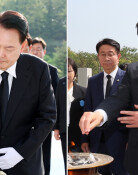Income-led growth through heavy tax spending will not be new economic model
Income-led growth through heavy tax spending will not be new economic model
Posted July. 26, 2017 07:22,
Updated July. 26, 2017 07:37
The Moon Jae-in administration confirmed "income-led growth" that aims to spearhead growth by increasing household income as the direction of its economic policy at a Cabinet meeting on Tuesday. It is a new policy based on the hypothesis that if the government actively intervenes in income distribution by expanding fiscal spending through a hike of the hourly minimum wage to 10,000 won (about 9 dollars) by 2020 and payment of childrearing subsidies for children aged up to five. The new policy aims to increase income, consumption and domestic demand, which in turn will allow Korea to achieve annual economic growth at the 3 percent level. As President Moon said that the direction of economic policy is the declaration that the paradigm of our economy will comprehensively shift, the new policy is completely opposite direction from export-led growth policy or deregulation-focused policy.
The government’s recognition of the reality that Korea can no longer achieve growth through the export-focused growth model chasing after advanced countries, and that the model can only intensify social conflict by deepening social polarization is well advised. If Korea is to address the gaps between households and companies, between conglomerates and small businesses, and between domestic demand and export that are prevalent in our society, the conventional industry-centered industrial policy will obviously entail limitations. If Korea can secure a virtual cycle in which improved income distribution leads to an expansion in disposable income at households, which in turn shores up domestic demand and increases jobs, this could potentially constitute a new model for the Korean economy.
However, it is uncertain whether income-led growth, an economic model that is unprecedented worldwide, is a solution to the problem facing the Korean economy. The income subsidy policy "Bolsa Familia," which Brazil’s Lula da Silva administration pushed to implement from 2003 to 2010, reduced poverty and brought about an annual average growth of 4.4 percent. But considering that it occurred during the period of a booming natural resources market, we can hardly believe that the success was due only to the income policy. Given that Brazil’s annual growth rate turned to negative from 2012, we cannot be certain whether it is a sustainable economic model either.
If Korea, a small-size open economy that is susceptible to changes in external environment, puts priority on pay increase over research and development aimed at staying ahead in technology, the country could end up lagging behind in competition. More than anything if Korea fails to manage and control household debts amounting to 1,400 trillion won (about 1,250 billion dollars), consumption will remain stagnant even if income increases.
From Wednesday, Korea is starting the giant experiment of income-led economic growth. Over the next five years, Korea is about to usher in "the era of intermediate burden and intermediate welfare benefit" in which its fiscal expenditures will outpace the expansion of its economic size. Since this is a path any other country hasn't ever successfully taken, the political circle and the government should display flexibility. Korea should give sufficient time for the conventional system to adapt itself to the paradigm shift, while preparing for changes that entail pain including tax hikes and industrial restructuring. Only then will the country be able to block the income-led growth policy from turning into populism.







